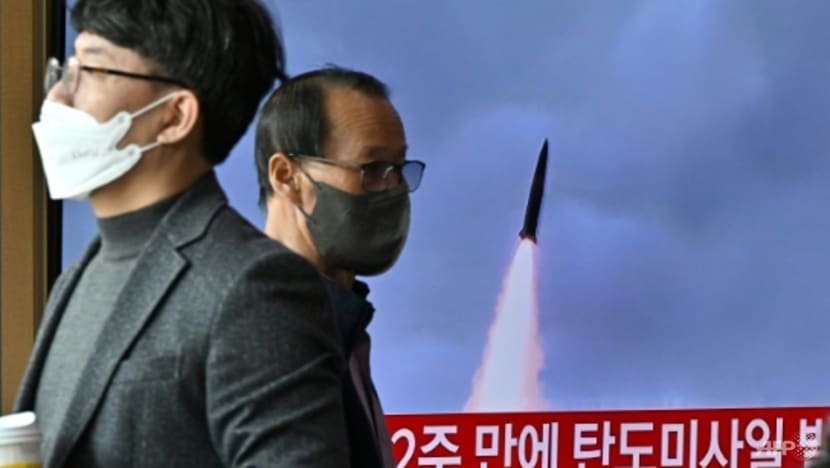North Korea’s brinkmanship diplomacy a tactic to force negotiations: Analysts
Concurrent military activities are signals that North Korea is displeased with the US and South Korea’s large scale military exercises, and is trying to coerce Washington and Seoul into stopping them, an expert said.

People watch a television screen showing a news broadcast with file footage of a North Korean missile test at a railway station in Seoul on Oct 28, 2022. (Photo: AFP/Jung Yeon-je)
North Korea’s recent spate of missile tests and military activities that sent neighbouring South Korea scrambling are tactics to force negotiations, even as it consistently rejects offers of dialogue, said analysts.
"This is the typical North Korea style diplomacy known as 'brinkmanship', and Pyongyang's message is very clear - it's to create pressure on the US and South Korea to initiate contact and to initiate negotiations," said Assistant Professor Yongwook Ryu from the National University of Singapore's Lee Kuan Yew School of Public Policy.
"For experts following the Korean affairs, this is nothing new," Assist Prof Yongwook Ryu told CNA's Asia Now on Thursday (Nov 3).
Despite routinely dismissing calls for talks, North Korea’s continued defiant show of strength is an attempt to seek negotiations on sanction relief and economic aid, but on its terms, experts said.
RESPONSE TO US & SOUTH KOREAN AIR DRILLS
Apart from forcing negotiations, there are other objectives to the missile tests, said Mr Bruce Klingner, a senior research fellow for northeast Asia at research institute The Heritage Foundation.
Typically, they are conducted for the developmental testing of new missiles. North Korea's tests in the past two months, however, were likely operational testing of tactical nuclear units that will be deployed near the demilitarised zone, all of which augment the country’s attack capabilities, Mr Klingner told CNA's Asia First.
Concurrent military activities on the ground, air and sea, are signals that North Korea is displeased with the US and South Korea's large scale military exercises, and is trying to coerce Washington and Seoul into stopping them, said Mr Klingner.
North Korea on Wednesday fired more than 20 missiles - a record number in a single day - one of which landed close to South Korean territorial waters.
Pyongyang earlier in the week warned of "powerful follow-up measures" as the US and South Korea held their largest combined military air drills involving some of their most advanced stealth fighter jets.
NORTH KOREA BECOMING BOLDER
Pyongyang has launched more than 60 missiles this year, more than any other year and more than the past four years combined, according to data provider Statista.
Mr Klingner said that any ballistic missile launch, regardless of range, is a violation of multiple United Nations resolutions.
North Korea has also directly violated a 2018 inter-Korean agreement several times by firing artillery shells into maritime buffer zones near the inter-Korean border that both sides have agreed to refrain from, Mr Klingner added.
South Korea has stepped up its response to North Korea’s latest missile tests, said Assist Prof Ryu.
While responses in the past were usually strongly-worded verbal warnings, South Korea on Friday scrambled fighter jets to maritime zones above the boundary between the two Koreas, and extended its joint air exercise with the US.
"All these responses are obviously designed to send out a very strong resolve to Pyongyang - that its brinkmanship diplomacy will not extract any concessions from either South Korea or the US," said Assist Prof Ryu.
RISKS OF CLASHES
Although it is unlikely for North Korea to launch any attack on its neighbours in the immediate future, there is growing risk of inevitable clashes with large militaries in close proximity to each other, said Mr Klingner.
"There's always the potential that one side or the other misconstrues routine exercises or a response as a precursor to an attack," said Mr Klingner. "And given that North Korea has very poor reconnaissance capabilities, they could misinterpret routine allied activity as a precursor to a preempt attack."
Mr Klingner said that even China, North Korea’s closest ally, is likely unhappy with Pyongyang’s nuclear programme and its frequent provocations. However, he said China is unwilling to apply pressure and would prefer status quo to avoid aggravating North Korea.
"(China) fears triggering even more provocative behavior by the North, or an implosion where the regime collapses and loses control of its nuclear weapons," he said. "So they don't like the situation but they prefer status quo to the potential of even worse conditions if North Korea would lash out or implode," he added.
DIPLOMACY OR SANCTIONS?
"Diplomacy has failed," said Mr Klingner, citing the multiple international agreements with North Korea that have all but failed.
"Arms control, denuclearisation, tension reduction, conventional force reduction - all these have merit but they all require a regime willing to sit in the same room as our diplomats, and North Korea has been unwilling to do that in the last several years," he said.
"So in the meantime we need to maintain and enhance our defence capabilities, and (apply) sanctions."
Sanctions serve to uphold and defend UN resolutions and also constrain both the import and export of nuclear- and missile-related components and technology to North Korea, as well as rein in money from illicit activities which the North uses to fund its nuclear missile programmes, he said.
Although Assist Prof Ryu said he felt that there are "very little bargaining chips to entice the other to make concessions", he believes that the solution is to reinitiate negotiation and diplomacy.
"If there is some movement toward diplomacy, that’s when we will see gradual rundown of these military exercises," he said.














